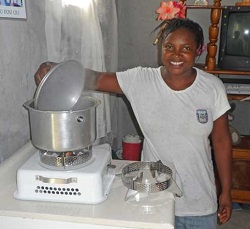 An American ethanol company is fighting fighting pollution and deforestation in Haiti with ethanol-fueled cook stoves. This news release from POET says the company has partnered with with Project Gaia to replace wood-burning stoves with the clean-burning, ethanol-fueled ones.
An American ethanol company is fighting fighting pollution and deforestation in Haiti with ethanol-fueled cook stoves. This news release from POET says the company has partnered with with Project Gaia to replace wood-burning stoves with the clean-burning, ethanol-fueled ones.
Today, most Haitians rely on charcoal and firewood to cook their daily meals. Consequentially, the nation has experienced extreme deforestation over the years, and now less than 2 percent of Haiti’s forest cover remains. Additionally, the United Nations estimates that the average lifespan in Haiti is shortened by 6.6 years due to illnesses caused by household air pollution, which results from burning wood and charcoal indoors.
To help remedy this problem, POET is teaming up with Project Gaia to supply the ethanol needed to power clean-burning stoves. Dometic, another partner in the project, is supplying the stoves, which will eventually be made locally, and Novogaz is organizing local distribution in Haiti. POET has selected POET Biorefining – Jewell to produce the ethanol needed to fuel the cook stoves. Project partners gathered in Haiti this past April to develop and discuss a plan to bring U.S. ethanol to Haiti for home cooking.
“The vision for this project is clear: to bring clean-burning ethanol fuel to the homes in third-world countries in order to improve the standard of living and drive positive socio-economic change,” said [POET Founder and Executive Chairman of the Board Jeff ]Broin. “For decades, we’ve known ethanol to be a clean, renewable fuel for our automobiles, and I look forward to bringing this same clean, renewable fuel to homes across the globe. With the help of our partners at Project Gaia, Dometic and Novogaz, I know we will be successful in our journey to bring clean cookstoves and clean energy to the world.”
POET is donating about 12,000 gallons of ethanol to jumpstart the project.
Project Gaia officials say that if every home in Africa, Developing Asia, Latin America and the Middle East currently using traditional solid fuels (charcoal, wood and other biomass substrates) would switch to ethanol fuel for cooking, it would save between 250 and 550 million forest acres per year.

